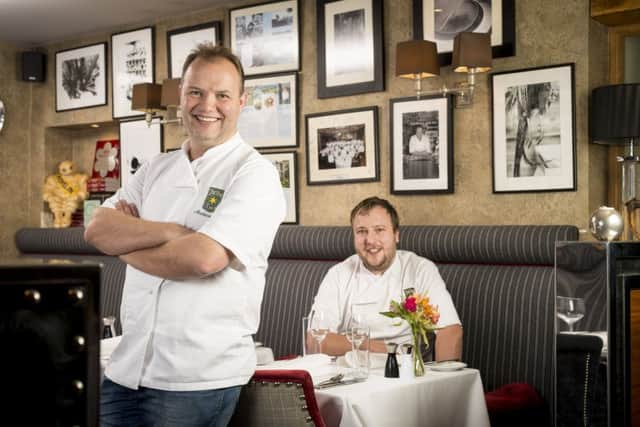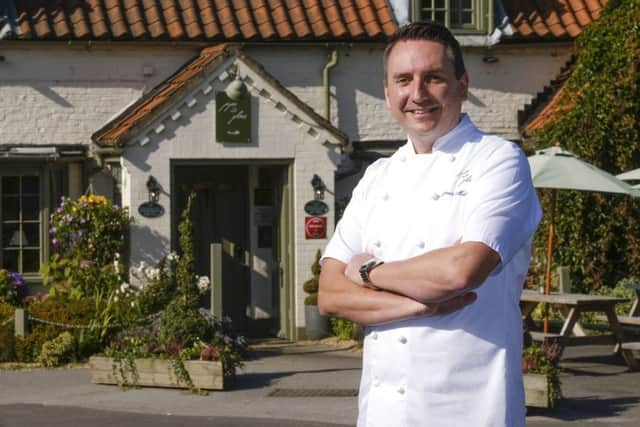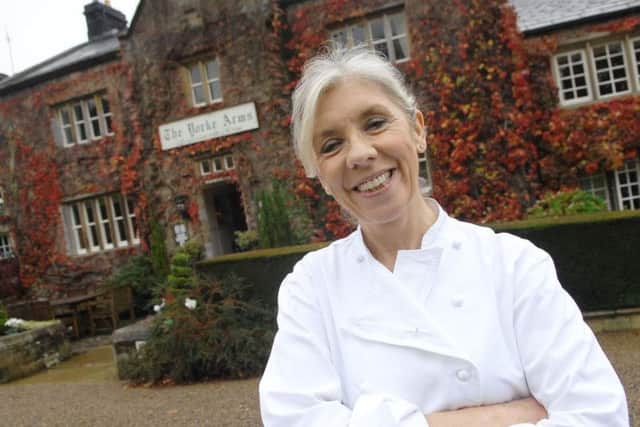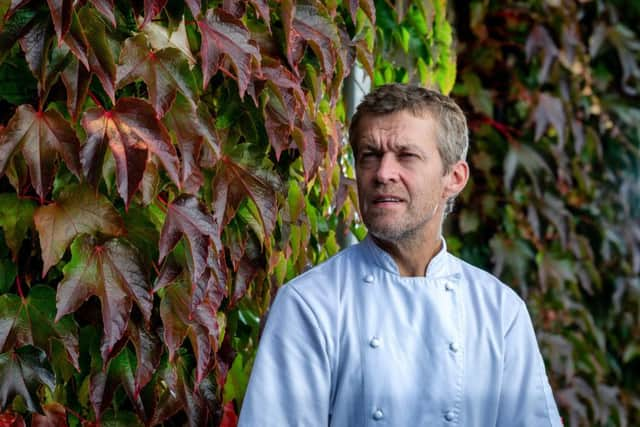The highs and lows of a Michelin star - we speak to some of Yorkshire’s top chefs


Atkins, who was Yorkshire only female Michelin starred chef said it was an opportunity, but for many chefs it has meant everything.
One French chef reportedly took his own life amid fears he had lost his three stars. Gordon Ramsay cried when his New York restaurant was stripped of its two stars and another is suing the Michelin guide after he lost a star.
Advertisement
Hide AdAdvertisement
Hide Ad

Few chefs know more about the high and lows of a Michelin star than Andrew Pern. The Yorkshire chef was travelling to London to film the Great British Menu in 2011 when his wife rang with the news that his Star Inn at Harome had lost its Michelin star.
“It was a complete shock,” says Pern. “We had been working towards getting two stars and then suddenly without warning, or explanation, we had none. Two hours later I was in front of five cameras filming the Great British Menu. It wasn’t the greatest time. We’d invested a lot in the business, we were employing 15 people in the kitchen and suddenly we had lost our star.”
Pern estimates financially losing the star cost him £300,000, but the emotional toll was greater. “I had to break it to the staff, some left. It was awful. You stop getting invited to certain things. I didn’t want to go to events, you’re no longer part of the club. Then you have to decide what to do next, we needed to win it back. I’m a determined Yorkshireman after all.”
Advertisement
Hide AdAdvertisement
Hide Ad

In 2002, Pern’s Star Inn was only the second pub to gain a coveted Michelin star. “We’d been awarded a Bib Gourmand the year before and so I called Michelin to see if we had retained it,” he recalls. “They said ‘no I’m sorry we’ve taken it away’ and my heart sank, but then they said they had replaced it with a Michelin star. It was amazing. We were a family run village pub, I was classically trained and my food reflected that, using the best produce in Yorkshire, but it was still a huge achievement for somewhere like us to get a Michelin star. We had always been popular locally with shoots and with Ampleforth College nearby, but gaining the star meant people further afield started to visit us.”
Father of seven, Pern who also has two restaurants in York and one in his home town of Whitby, held the star for nine years before losing it. He spent four years fighting to get it back which he achieved in 2015.
“It meant more regaining the star than winning it in the first place. It was such hard work as you have no idea what Michelin are looking for - we got no feedback or explanation. In the end we went back to basics and had nearly given up, but then we won it back.”
Advertisement
Hide AdAdvertisement
Hide Ad

He says although losing the star was a low point in his career, in hindsight it made him look at what was happening with his business. “We are very much a family business. My wife Fran runs the hotel side of things and some of my children help out in the school holidays. Steve Smith is head chef and is very much in tune with our ethos.”
But for others Michelin recognition is not what it once was. Simon Gueller, who has held 20 Michelin stars in his culinary career, believes Michelin has lost its way.
“I do feel that it has been devalued,” says the 55 year old who last year lost the star he had held for 14 years at the Box Tree in Ilkley. “Michelin isn’t what it used to be. I have friends who have two stars and I know the work and sacrifices they have made to get them. But then this year a restaurant that has only been open a matter of months is given two stars straight away.”
Gueller got his first star in 1996 at Rascasse in Leeds, the biggest restaurant outside of London to gain a Michelin star. “It was amazing, I got a phone call from Marco (Pierre White) who’d been out and bought a copy of the guide as that was the only way back then that you knew if you were in it. It was amazing.” Now chefs find out if they have gained star at a ceremony in London. If you don’t get an invite you can assume you’ve lost your star.
Advertisement
Hide AdAdvertisement
Hide Ad

He left Rascasse to set up his eponymous restaurant in Leeds that too gained a star in 2002 and after taking over the Box Tree he was again given the accolade in 2005.
He says while initially he and wife Rena were very disappointed at losing the star, it has found it ‘liberating.’
“Losing the star has freed me from the constraints I was starting to feel. I am a believer in the way I cook, quality ingredients cooked classically that are all about the taste and I set myself very high standards. Today’s young chefs seem to be more interested in how things look on Instagram. I am too old to change and I don’t want to. Most of our customer are regulars and care about the food and the service not about whether we have a Michelin star.” But he says losing the star has caused problems in recruiting and retaining staff, many who want to work in a Michelin-starred kitchen.
Gueller announced last month that he was selling the Box Tree - the only Yorkshire restaurant to be included in the first Michelin Guide to Great Britain and Ireland in 1973. It still remains the only Yorkshire restaurant to have ever held two stars.
Advertisement
Hide AdAdvertisement
Hide AdWhile gaining a Michelin star is nice to have, it should not be a chef’s entire focus says James Mackenzie of the Pipe and Glass in South Dalton.
In 2006, Mackenzie was the first chef to win a Michelin star in East Yorkshire and he says it does comes with some responsibility. “It is a fantastic accolade to have, especially for the staff. But it does give people a certain expectation when they come here. Some people are surprised that we are a pub.
“I do think some people can try too hard and focus entirely on trying to second guess what Michelin want and you just can’t. It’s not like it’s a tick box exercise so all you can do is stay true to yourself, the food you are producing and that you are making sure your customers are happy. At the end of the day that is what it is all about.”
Advertisement
Hide AdAdvertisement
Hide AdHe admits that he still gets nervous as the date of the Michelin star awards in October gets closer. “You do worry about it, not day to day, but it is at the back of your mind.”
Yorkshire now has five Michelin stars after Michael Wignall and the Angel at Hetton this year joined The Star Inn, Harome, The Pipe and Glass, South Dalton, The Black Swan at Oldstead and The Man Behind the Curtain in Leeds.
Michelin says stars are awarded on ‘the quality of a restaurants food alone,’ which are assessed according to five criteria: quality of ingredients, skill in food preparation, combination of flavours, value for money and consistency. A one star denotes a ‘very good restaurant in its category’, a two star serves excellent cooking that’s worth a detour and three star restaurants are places with exceptional cooking worth a special trip for.
While Michelin remains something of an enigma, what is clear is that gaining, and losing, a Michelin star is a hugely emotional experience. What started out as a little red motoring guide book, now wields the power to make and break a business.
Yorkshire Michelin star facts
Advertisement
Hide AdAdvertisement
Hide AdOnly 13 Yorkshire restaurants have ever held a Michelin star
The Box Tree, Ilkley was the only Yorkshire restaurant to be awarded a Michelin star in the first Michelin Guide of GB and Ireland in 1973.
The Box Tree is also the only Yorkshire restaurant to have two Michelin stars
In 1997 Rascasse, Leeds became the largest restaurant outside of London to gain a Michelin star.
Advertisement
Hide AdAdvertisement
Hide AdTessa Bramley was Yorkshire’s first female Michelin starred chef when her Old Vicarage restaurant in Sheffield was awarded a star in 1999
In 2002 the Star Inn, Harome was only the second pub to get a star.
Tommy Banks became the UK’s youngest Michelin starred chef in 2013 when the Black Swan, Oldstead retained its star